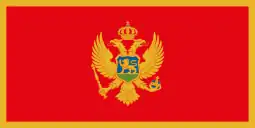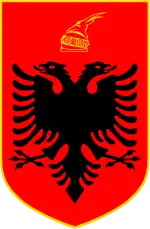| Rail transport in Albania | |||||
|---|---|---|---|---|---|
 HSH train on the Tirana-Durrës line | |||||
| Operation | |||||
| National railway | Hekurudha Shqiptare | ||||
| Statistics | |||||
| Freight | 0.34 million tonne-km (2017)[1] | ||||
| System length | |||||
| Total | 424 kilometres (263 mi)[1] | ||||
| Double track | 0 km (0 mi)[1] | ||||
| Electrified | 0 km (0 mi)[1] | ||||
| Track gauge | |||||
| Main | 1,435 mm (4 ft 8+1⁄2 in) standard gauge | ||||
| High-speed | 1,435 mm (4 ft 8+1⁄2 in) | ||||
| |||||
Railways in Albania are administered by the national railway company Hekurudha Shqiptare (HSH) (Albanian Railways). It operates a standard-gauge railway gauge (1,435 mm (4 ft 8+1⁄2 in)) rail system in Albania. All trains are, currently, hauled by Czechoslovak-built ČKD diesel-electric locomotives.
The small system, now mostly dysfunctional, was considered by many travel guides as a tourist attraction and de facto a panoramic train journey, however the railway from Elbasan to Pogradec, the most beautiful part of railway, was closed in 2012 due to the poor condition of the line and the structures along it.[2] The Section of the Shkodër - Vora line south of Laç is closed. The tracks on the Tirana - Durrës line have been removed as it is currently undergoing rehabilitation works. The Durrës - Elbasan service had its Durrës-bound terminus moved up the line to Plazhi due to rehabilitation works at the Durrës station. This is, currently, the only operating passenger rail service in the country, running every Friday, Saturday, and Sunday.
There is only one international link, with Montenegro, the Podgorica–Shkodër railway, which has only ever been used for freight traffic, and whose last station in Albania is the Bajzë Rail Station. The condition of the line is very poor, with a lot of the damage caused by the 2019 earthquake.[3] As such, a lot of the line is out of commission, and a journey cannot currently be completed between the two termini.
History
Before 1947, Albania was the only country in Europe not to have a standard rail service, although some narrow (decauville) gauge lines were built during World War I.[4] In 1947, Albania's first standard gauge line was opened between Durrës and Peqin, measuring 44km. This was soon followed by the Durrës-Tirana line in 1948.
The railway system was extensively promoted by the government of Enver Hoxha, during which time the use of private motor transport was effectively prohibited. By 1987, 677km of track had been constructed,[5] linking the main urban and industrial centres. Train transport was the main transportation method until the collapse of Communism in 1990.
After 1991, the railway network slowly began falling into disrepair. Since 1991, there has been a considerable increase in car ownership and bus usage. Whilst some of the country's secondary roads are still in a very poor condition, there have been other developments (such as the construction of a motorway between Tirana, Durrës, and other towns) which have taken much traffic away from the railways. Lack of government investment led to a slow decline for the railways, with stories of railway employees pitching in their own money for repair works.
As of 2015, some stations and rolling stock along the Durrës–Tiranë railway line was being renovated and coloured red and white.
Timeline

- November 1947 - Opening of the first standard gauge railway line (from Durrës to Peqin).[5]
- June 1957 - Introduction of the diesel-electric locomotives.[5]
- July 1973 - Completion of the railway line from Elbasan to Prrenjas, the first Albanian line through the mountains.[5]
- September 1986 - First international rail freight (to and from Montenegro, then part of Yugoslavia).[5]
- 2000 - HSH ceases to be a state enterprise, becoming a limited company (although state owned).[5]
- 2005 - Other rail operators allowed track access.[5]
- August 2013 - The Tirana railway station is closed for the construction of the New Boulevard (Albanian: Bulevardi i Ri).
- 2019 - 29 November earthquake causes damage to parts of the network across the country, particularly on the Vorë - Han i Hotit line.
- 2020 - Most of the network closed
- 2021 - The only functioning passenger trains are on the Durrës - Elbasan line every Friday, Saturday, and Sunday. And on the Shkoder - Laç segment on the Vlore - Han i Hotit line (except this train only functions from 14.3.23 - 13.6.23 on every Monday and Tuesday).
- 2022 to Present - As rehabilitation works continue on the Durrës station, the Durrës - Elbasan line's terminus is moved, but services continue.
Present day network
The HSH passenger system is virtually defunct. The last operating service, the Durrës - Elbasan line had its terminus moved, meaning it serves Durrës via a station around 6 kilometres (3.7 mi) away.

The Librazhd - Pogradec line, was closed for passenger traffic in 2012. The stored locomotives and wagons from Prrenjas were moved to Elbasan. Though the newly built Elbasan-Podgradec highway incorporated bridges over the railway track, thus leaving open the possibility of their eventual reopening, it is unlikely that services to Elbasan and beyond will resume.
Rehabilitation of the Fier - Vlorë mainline is currently being carried out by Albrail for freight purposes, a private company which bought the rights to that track from HSH. Immediately south of Fier a number of short spurs to industrial areas have been re-laid.
In 2019, 5 trains per day ran on the network. 1 train Kashar - Elbasan, 2 trains Durres - Shkoder and 2 trains Durres - Elbasan.[6] In the spring of 2022, the stretch between Shkodër and Lac of the original Shkodër–Vorë railway was served once weekly on Tuesday.
Rehabilitation works
Tirana - Durrës
As of September 2023, the Tirana - Durrës line is the only one with ongoing rehabilitation works. The rehabilitation, funded by a loan of €35.9 million from the European Bank for Reconstruction and Development and a €35.5 million grant from the Western Balkans Investment Fund, includes the complete overhaul of around 40km of track, including a new section to Tirana International Airport Nënë Tereza, as well as the construction of new stations all across the line. Due to a delay with the construction of the various bridges included in the project, it is now expected to be finished in March 2024.[7]
The trains are expected to run at around 100 km/h (62 mph) to 80 km/h (50 mph) between Tirana PTT, Durrës, and the airport, with slower speeds between Tirana PTT and the stations located closer to the city center. Some government officials have claimed that the trains will be electrified, but official sources do not sufficiently confirm this. The Tirana - Durrës leg is expected to take 22 minutes, and the Tirana - Rinas Airport leg is expected to take 12 minutes.[8]
Vorë - Hani i Hotit
As of September 2023, the Vorë - Han i Hotit line, sometimes known as the Shkodër–Vorë railway, is in the final stages of preparation before construction begins. The project is expected to follow the same geography as the currently existing line. Similarly to the Tirana - Durrës line, the trains are expected to reach a maximum speed of 120 km/h (75 mph), however, the track will not be electrified.[9][10]
Future
Durrës - Rrogozhinë - Elbasan - Progradec line
On 9 October 2018, the Feasibility Study for rehabilitation of the Durrës - Rrogozhinë - Elbasan - Pogradec railway line was presented, funded by European Commission funds, made available through the Western Balkans Investment Instrument. A pre-feasibility assessment was completed for the 151 km (94 mi) Durrës to Pogradec line. The focus was on the 72 km (45 mi) line between Durrës, Rrogozhinë, and Elbasan.
The Durrës - Rrogozhinë segment was rated the highest priority for rehabilitation. The rehabilitation cost is estimated at EUR 52 million which will meet European Network design standards at speeds of 100 km/h (62 mph) and axle load of 22.5 tons. Travel time will be reduced from 60 min to 32 min. The flow along this segment is expected to reach 330,000 passengers and 1,100,000 tons of goods by 2047. Estimated value in time saving for users of the Albanian transport system will be 0.65 million euros for travelers and 15.3 million euros for freight transport. Additional savings from the reduction in the cost of operating vehicles in road transport are estimated at EUR 0.5 million for travelers and EUR 8.7 million for freight transport.[11]
Durrës-Pristina line
Albania and Kosovo signed a memorandum of understanding (MoU) paving the way for the construction of a railway line that will link the Adriatic port of Durres to Pristina, the capital of Kosovo.[12]
On 20 June 2022, both governments signed another agreement to build the railway track connecting Durrës and Pristina. The memorandum covers the feasibility study for the project that is expected to cost some €1.98 million. Of this total, Albania will contribute €1 million and Kosovo €980,000.[13][14] The feasibility study will take 14 months.
Progradec-Krystallopigi line
In 2021, it was announced that a railway linking Albania and Greece was entering planning stages.[15] The line, with a length of around 130 km (81 mi) of new track, connect between the two countries through Florina-Krystallopigi-Pogradec.[16] The line is planned to be single-track and electrified.[17]
Pan-European Corridor VIII
Albania, Bulgaria and North Macedonia have signed on 19 October 2021 an agreement to complete Pan-European Corridor VIII.[18]
The Durres - Pogradec line will be extended by 3 km (1.9 mi) to Lin where the tracks will continue into North Macedonia.
North Macedonia is currently seeking funding for the rail link.[19]
Statistics
Usage of the railway network of Albania is declining year by year.[20]
| 1950 | 1965 | 1970 | 1975 | 1980 | 1985 | 1989 | 1993 | 1994 | 1995 | 1996 | 1997 | 1998 | 1999 | 2000 | 2001 | 2002 | 2003 | 2004 | 2005 | 2006 | 2007 | 2008 | 2009 | 2010 | 2011 | 2012 | 2013 | ||
|---|---|---|---|---|---|---|---|---|---|---|---|---|---|---|---|---|---|---|---|---|---|---|---|---|---|---|---|---|---|
| Passengers | in thousands | 3,961 | 4,022 | 3,739 | 3,389 | 1,820 | 2,269 | 2,270 | 2,381 | 2,676 | 2,270 | 2,070 | 1,758 | 1,440 | 1,659 | 1,091 | 822 | 645 | 430 | 453 | 448 | 329 | |||||||
| in millions pass.-km | 223 | 215 | 197 | 168 | 95 | 116 | 121 | 125 | 138 | 123 | 105 | 89 | 73 | 80 | 51 | 41 | 32 | 19 | 18 | 16 | 12 | ||||||||
| Freight | in thousands tonnes | 539 | 522 | 574 | 521 | 284 | 305 | 361 | 412 | 258 | 340 | 520 | 417 | 404 | 450 | 399 | 355 | 343 | 403 | 317 | 142 | 151 | |||||||
| in millions ton.-km | 54 | 53 | 53 | 42 | 23 | 25 | 27 | 28 | 19 | 21 | 31 | 32 | 26 | 36 | 53 | 52 | 46 | 66 | 50 | 25 | 23 | ||||||||
| Network length[21] | in kilometres | 115 | 143 | 193 | 272 | 319 | 421 | 447 |
Rail links to adjacent countries
All neighbouring railways share the same gauge.
 Montenegro - freight only
Montenegro - freight only Greece - planned[22]
Greece - planned[22] North Macedonia - no connection, planned
North Macedonia - no connection, planned Kosovo - planned
Kosovo - planned
See also
References
- 1 2 3 4 "Railway Statistics – 2017 Synopsis" (PDF). International Union of Railways, IUC. 2017. Archived from the original (PDF) on 7 April 2019. Retrieved 11 June 2019.
- ↑ "Njoftim për shtypin". Hekurudhat Shqiptare. 11 October 2018. Archived from the original on 4 April 2019. Retrieved 18 December 2018.
- ↑ Zito, Eralda (2023-06-29). "Hekurudha Vorë-Hani i Hotit, tenderi në korrik, projekti me vlerë 356 milionë euro". Revista Monitor. Retrieved 2023-09-11.
- ↑ Sivenas, Nikiforos (February 19, 2017). "The Almopia Decauville train".
- 1 2 3 4 5 6 7 "Hekurudha ndër Vite". Hekurudha Shqiptare (in Albanian). Retrieved 2023-09-11.
- ↑ "PASSENGERS TRAINS TIMETABLE FROM 1 APRIL2019". hsh.com.al. Archived from the original on 30 June 2022. Retrieved 10 August 2022.
- ↑ Saracini, Klotilda (2023-05-04). "Rama: Hekurudha Tiranë-Durrës avancon çdo ditë, përmbyllet në vitin 2024 - ATSH -". Agjencia Telegrafike Shqiptare. Retrieved 2023-09-11.
- ↑ admin (2022-06-20). "Rehabilitimi i linjës hekurudhore Tiranë-Durrës dhe ndërtimi i një lidhje hekurudhore me aeroportin e Rinasit". Hekurudha Shqiptare (in Albanian). Retrieved 2023-09-11.
- ↑ "VORE HANI I HOTIT RAILWAY LINE - GLOBAL GATEWAY". European Investment Bank. Retrieved 2023-09-11.
- ↑ Zito, Eralda (2023-06-12). "Hekurudha Vorë-Hani i Hotit, projekti kalon rishikimin final nga BERZH". Revista Monitor. Retrieved 2023-09-11.
- ↑ "Njoftim Për Shtypin". Hekurudhat Shiqiptare. 11 October 2018. Archived from the original on 4 April 2019. Retrieved 18 December 2018.
- ↑ "Albania, Kosovo open way for Durres-Pristina railway link". seenews.com. Retrieved 2021-06-09.
- ↑ Ceta, Kristi (2022-06-20). "Albania-Kosovo sign 19 Agreements". Albanian Daily News. Archived from the original on 2022-08-29. Retrieved 2022-08-29.
- ↑ "The railway line Pristina-Durres, how much the feasibility study will cost the two countries". Politiko. 2022-07-21. Archived from the original on 2022-08-29. Retrieved 2022-08-29.
- ↑ "New railway line is underway and will connect Greece with Albania". Independent Balkan News Agency. 2021-05-21. Retrieved 2021-07-04.
- ↑ "Kefalogiannis: Discussions of a Greek-Albanian railway interconnection". Greek City Times. 19 April 2021. Retrieved 2021-07-04.
- ↑ admin (2021-06-11). "Projekti hekurudhor midis Shqipërisë dhe Greqisë". Hekurudha Shqiptare (in Albanian). Retrieved 2023-09-11.
- ↑ Burroughs, David (2021-10-21). "Agreement to complete Adriatic Sea - Black Sea connection". International Railway Journal. Retrieved 2022-08-17.
- ↑ "N. Macedonia to seek 426 mln euro financing for Kicevo-Albanian border railway". seenews.com. Retrieved 2021-07-04.
- ↑ Railway transport of goods and passengers (1993-2013). INSTAT (Institute of Statistics). Tirana, Albania
- ↑ Sako Z. Ilir MBA MSc (2008), Railway market: Albanian Railways - a difficult heritage
- ↑ Bureau, Athens (2021-04-19). "Kefalogiannis: Discussions Of A Greek-Albanian Railway Interconnection – Greek City Times". Retrieved 2022-08-17.

